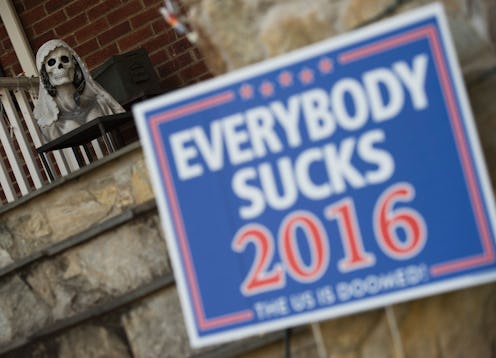Life
Satirical News Is More Influential Than You Think

If you're one of the thousands of people who prefer their news packaged in the form of late-night comedy, take note: According to recent research from Ohio State University, satirical news reinforces political opinions just like the regular, less entertaining variety. Consider this your regular reminder that confirmation bias is a real thing, and that staying informed means tuning into a few different sources — ideally ones that represent different points of view.
In a study published in the Journal of Communications, researchers asked 146 participants to choose news clips about politically divisive topics: Gun reform, climate change, and immigration. Each clip took either a conservative or liberal stance, and they were either satirical or serious. But here's the catch: All the clips were actually from C-SPAN. Researchers just modified the overview text and scrolling commentary within the videos to match the assigned category.
To measure the effect these clips had on viewers, participants took a survey about their attitudes about the three topics as well as their feelings on their political efficacy, aka the ability to cause political change. Finally, at the very end of the experiment, they were asked about their political leanings and media consumption.
According to the results of the study, people were more likely overall to watch clips from serious news sources, and unsurprisingly, they also tended to choose the clips that lined up with their political beliefs. However, people who said they paid less attention to politics were most likely to pick out a satirical clip to watch.
There were a few unexpected findings: Republicans generally chose conservative satire, which lines up with what we know about confirmation bias. On the other hand, Democrats went for either variety, which researchers attributed to curiosity rather than any particular open-mindedness. After all, most satire tends to slant toward a liberal viewpoint. Researchers also found that political leanings influenced people's perceptions of political efficacy. Republicans felt less capable of influencing politics after viewing satire, while Democrats felt more capable.
The main point of interest, however, was satire's unexpectedly strong influence on people's opinions. Researchers found that while satirical news might be wrapped in comedy, but it still strengthened viewers' political views — as long as the satire lined up with their preexisting ideas.
These findings demonstrate how rapidly the field of journalism is changing. In 2014, research from the Pew Research Center (PRC) found that 10 percent of American adults relied on The Colbert Report as a news source. In early 2016, the PRC reported that around a third of people between 18 and 24 years old listed social media as the "most helpful" source for learning about the election.
Of course, not all satirical news is created equal. Shows like The Colbert Report and The Daily Show have teams of writers and researchers behind each episode. The "fake news" that cropped up around the 2016 election, meanwhile, was sometimes described as satirical — but the reality is that these articles were simply untrue. The current president has also referred to CNN as "fake news," which just goes to show that the definition of satire appears to depend on the person (or the point they're trying to make).
The takeaway of all this? Satire wields a stronger influence than you might think. It's not a bad thing, but if it's your only way of keeping up with current events, you might want to branch out to some nonpartisan sources.